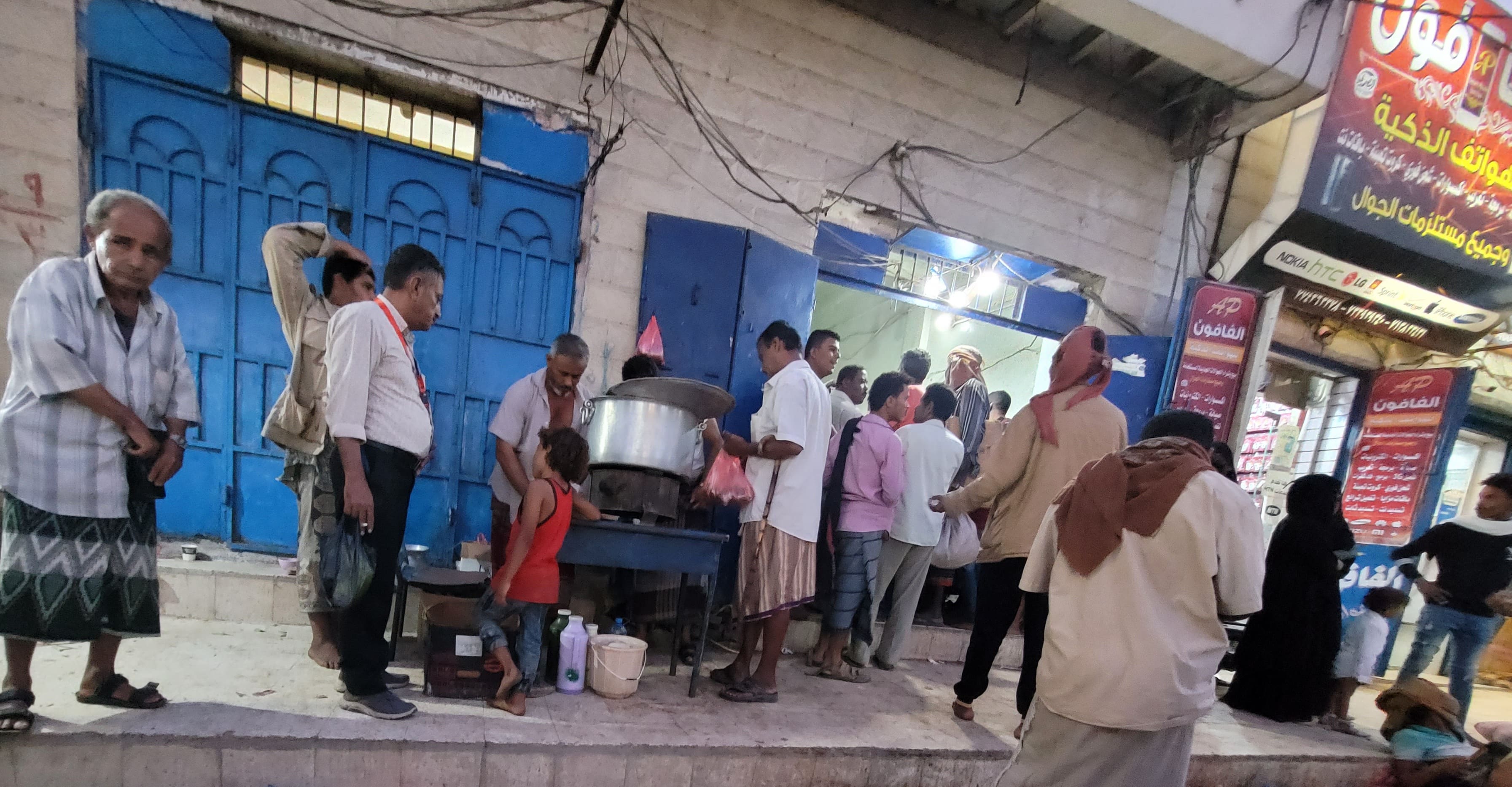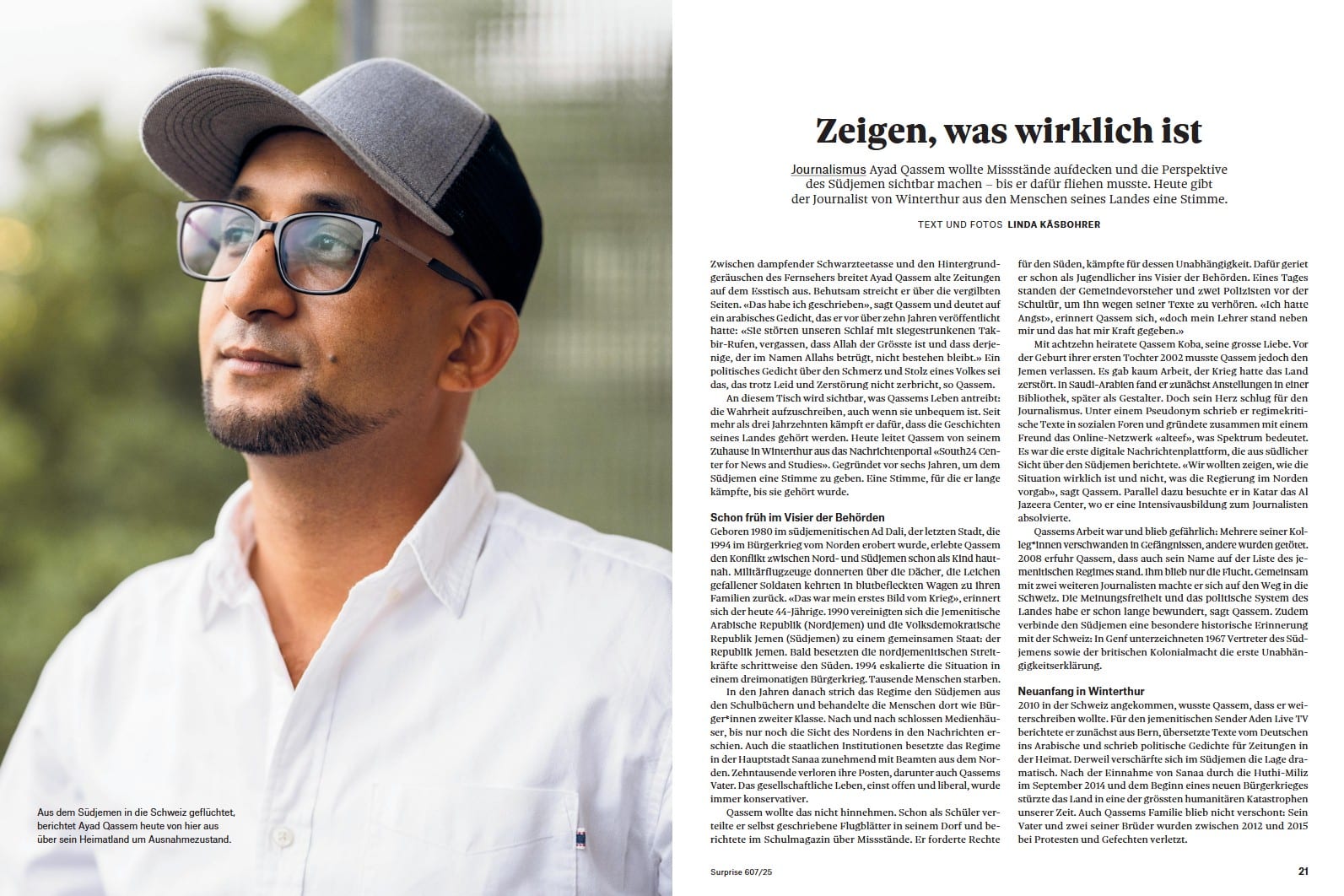
آخر تحديث في: 29-11-2021 الساعة 8 مساءً بتوقيت عدن
Reem Al-Fadhli (South24)
Saeed Ahmed (60 years), a resident of Sheikh Othman district in Aden, used to go to the bakery near his house in one of the district’s streets, to buy his needs of “roti” bread and loaf. He was surprised by a group of people lining up in long lines, overshadowed by random crowding, shouting and chaos. A group of women, men, and children preceded him in front of the door of the bakery. But he decided to return to another bakery in the same street, only tens of meters separated from the first. Saeed was astonished to find the second place empty, hardly anyone pass by to buy.
Saeed did not know that the reason for all this crowding was the price difference (20 Yemeni riyals) between the bakeries, which occurred after the support provided by the local authority in the city to some bakeries to reduce the price of the roti from 50 riyals to 30 riyals, after its recent rise as a result of the severe economic crisis that The country is going through and the high exchange rate of hard currencies against the Yemeni riyal.
The price discrepancy between bakeries has caused panic among the people in the city, especially those with low incomes and they are the largest group, as one day cannot pass without eating roti bread, forcing them to go out at once to head towards the subsidized bakery, which is often one of dozens in each district.
One of the non-subsidized bakeries in Aden November 28, 2021 (South24, Reem Al-Fadhli)
Because it can only be bought fresh around the time of dinner, dozens of people rush early to wait by the oven before the first batch comes out, so that the purchase is not missed as soon as the owner of the bakery announces that the day’s batch has finished. Some who could not catch up, to go buy from another place at the new price (50 riyals).
Prices beyond reasonable
After the capital Aden witnessed a significant increase in the prices of fuel, household gas, flour and other basic ingredients that are used in the making of “roti” bread, the value of its sale doubled during the past two months, after its previous price ranged between 30-35 riyals per piece, to be sold today at a value of 50 riyals.
Specifically last September, after the Ovens and Bakeries Association issued a statement warning of the catastrophic situation experienced by bakeries owners in Aden, and mentioned the owners' intention and their right to carry out a comprehensive strike as a "fair" response to what they are facing, in exchange for the silence of the concerned authorities and their inaction in putting an end to the problem currency and rising fuel prices.
Less than one month later, a statement was issued by the Association acknowledging the increase in the selling price of roti and bread by 10 riyals above the previous price in all city bakeries.
In its statement, the Association attributed the reason to the increase of more than 100% in the materials used in the manufacture of roti and bread, in addition to the high costs facing oven owners, such as the increase in rental prices for shops, fuel, labor wages, and transfer fees.
Housewife Alia Ahmed spoke to "South24" about the impact of the news of the rise in the price of bread in the city: "The news was really heartbreaking, and we all entered a loop of exhausted thinking."
She added, "I am a housewife with six children, and my husband's monthly income does not exceed 70,000 riyals. In the past, we have endured a lot, and I do not know how we will be able to provide our children's livelihood in the coming days with this continuous rise, which is met with shameful silence from the government that is supposed to manage the affairs of people above everything else."
Temporary solutions
After the city was buzzed with news of raising the prices of bread, the office of the Ministry of Industry and Trade in Aden issued, at the beginning of this November, a decision to support 73 bakeries across the eight districts of Aden based on the directives of Governor Ahmed Lamlas, to be sold at a price of 30 riyals per piece. In return, the local authority will guarantee the difference in the subsidized flour price.
This decision was greeted with great enthusiasm and joy by the citizens of the city, but it did not take long until it seemed like a drug to silence their voices.
Many citizens asserted that “the volume of baked goods sold in some subsidized ovens is clearly tampered with,” and many of them shared pictures on social media of that. South24 was unable to verify the veracity of these allegations.
Ibrahim Thabet, a resident of Khormaksar district, told "South24" that he had refrained from buying his daily roti from those subsidized bakeries.
Ibrahim attributed this to the fact that “what is happening is just clear manipulation of people’s minds,” and he adds: “This is what we are always used to from all decisions that are issued on the basis that they are in our interest, but all of this is just nonsense, clear manipulation and great corruption.”
According to Ibrahim: "It would have been better for them to lower the price of flour and set a fixed price on it regardless of the change in the currency, or to have put a radical solution to this deterioration, which proves day after day he failure of all government members."
For his part, the Ministry of Industry and Trade Office Director, Mohammad Ebadi, told "South24", "The process of controlling the subsidized ovens is continuing, and that the descent of the Control Committee is almost continuous.
Mohammad continued, "The Complaints and Monitoring Committee has seized a number of bakeries, and the necessary measures have been taken, and they are dealt with seriously."
He stressed, "such a violation to the livelihood of the simple citizen will not be tolerated, just as the committee supervising and receiving complaints is vigilant about such actions and always receives every complaint that come from citizens."
Oven owners between the anvil of the authority decisions and the hammer of the rising currency
Several bakeries in the city of Aden and its suburbs closed their doors, due to people's reluctance to buy and turn to subsidized bakeries, and some reduced their working hours, while other bakeries worked fewer hours only to manufacture roti and sell it to cafes, cafeterias and shops.
Sweat drips from the brow of a bakery owner in Aden, exhausted from casting metal molds, from inside the traditional roti-making oven. Leaning against the wall of the place to take a break from the rising heat, and after catching his breath, he told "South24", "not subsidized ovens are not able to continue in this way, our income is no longer the same as before and the costs are very high."
The owner says that he had to lay off some workers because he did not need them and was unable to pay them the same salary.
He added, "Customers hardly come to us to buy where in the past, our work did not stop for most of the day. We suffer from this increase in prices and I also support my family, and everything I buy for them is expensive."
The man wishes "if there were real and radical solutions to the exchange crisis that would do justice to everyone and help them in their livelihood."
On the other hand, Salem Al-Hazaa, owner of one of the subsidized bakeries in Sheikh Othman, told "South24": "We refrained from distributing the roti to shops and restaurants. When we were doing that, half of what we produced went to them, which relieves the pressure in selling."
He continues, "people are reluctant to buy from most of the bakeries near their areas, and the pressure has become great on us. We are making a double effort than before."
He adds, appealing to officials: "The flour must be subsidized in the entire country, so that no one is pressured and everyone can buy cheaply from anywhere."
Journalist and editor at South24 Center for News and Studies
Photo: Citizens queuing in front of a subsidized bakery in Aden, November 28, 2021 (South24, Reem Al-Fadhli)

قبل 3 أشهر

قبل 3 أشهر